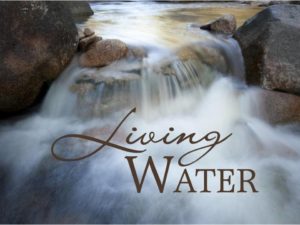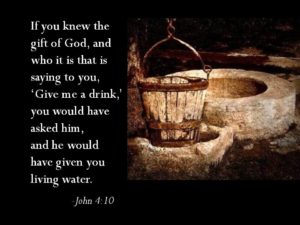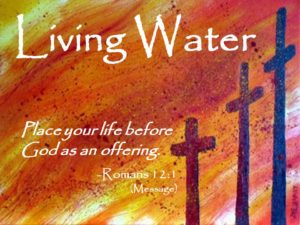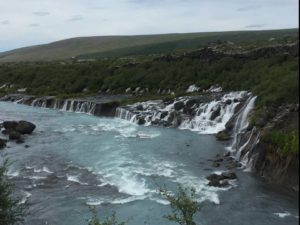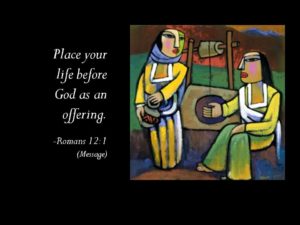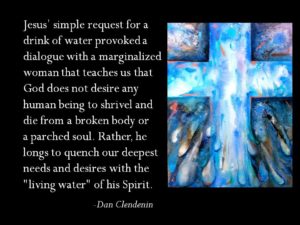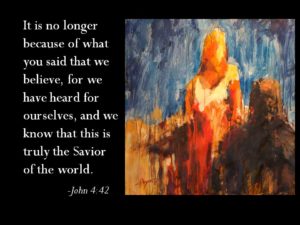In the give and take of a relationship with God, this “Living Water” that Jesus offers has the power to not only quench our thirsts, but to wash away all that keeps us from living the life that God intends – to wash away all that keeps us from drinking deeply from the living water of God.
“If you knew the gift of God, and who it is that is saying to you, ‘Give me a drink,’ you would have asked him, and he would have given you living water.” (John 4:10)
I have given some thought this week to the idea of “Living Water”. First thing that came to mind was the many mission trips we have taken over the years – the ones with the high school and middle school kids – but also the ones with adults when we spent time in Tennessee, Kentucky, Virginia, Indiana and even down in Mississippi in the aftermath of Hurricane Katrina.
We have gotten ourselves into some dirty, itchy, scratchy jobs on those trips – and often the most refreshing part of those days was the shower – or the jump in the lake or the pool at the end of the day. I seem to recall even a garden hose or two that brought instant refreshment. Water restoring and refreshing and maybe giving a brief experience of the “Living Water” of which Jesus speaks.
And then I thought about the trip that Pr Sarah and I took last summer to Iceland. If you know anything about Iceland or have been there yourself, you know that it is a land of thermal springs and waterfalls. As we made our way driving around that beautiful country, it was almost not possible to look in a direction that did not include a waterfall.
One particular place made an impression on me – it was just down the road from one of the places we camped. As you can see in the picture, a river runs along the edge of a lava field – amazingly, the waterfalls just pour out of that field as far as the eye can see. The water is not forced in any one direction – it comes out in all manner of places, flowing faster here and slower there. Perhaps another way to think about this Living Water from Jesus.
And then another possibility came to mind, I thought about those hard, necessary conversations that happen in relationships. Words that seek accountability and integrity – words of confession and requests for forgiveness – words that bring reconciliation often amidst the shedding of tears. Perhaps those tears that are shed are also an example of Living Water.
Part of the challenge for the Samaritan woman whom Jesus encounters and really for us as well, is that we both aren’t quite sure what Jesus is talking about.
The woman is not tracking his meaning, because there they are sitting at a well with Jesus asking her for a drink of water – who can blame her for thinking that he was talking about a cupful from the well – and now he is talking about something completely different – water that will not only quench her thirst, but bring abundant life out of brokenness.
Likewise for us – we may be a step ahead of the Samaritan woman in understanding who Jesus is, but we still can find it challenging to recognize this gift that Jesus is offering – attempting to imagine and equate and fit our own experiences into these mysterious words.
In these weeks of Lent we have been considering the words of Romans 12:1 – the invitation to “Place our lives before God as an offering”. In the story of the woman at the well we might think that this is a one-sided deal – Jesus has what the woman needs, what we need – he is offering and we are the ones on the potential receiving end of that gift.
But that’s not the full story – what is instructive here is not just the “what” but the “who”. Jesus is offering this amazing gift – one that is hard to imagine and explain, but the fact that he is offering it to a Samaritan, who is also a woman – well this is too much.
Just ask his handlers, the disciples – they must have been thinking – “we leave him alone for 30 minutes and look at what he gets himself into”. Again, we talk about this with some regularity – Jesus is breaking boundaries here – Jews and Samaritans did not interact with one another – add to the mix that Jesus is speaking to a woman and there is all kinds of potential damage control needed here.
But this is the pattern that we get from Jesus – what really is the core of Jesus’ message – his call is a call to inclusion and dignity and empowerment and affirmation.
Jesus’ simple request for a drink of water provoked a dialogue with a marginalized woman that teaches us that God does not desire any human being to shrivel and die from a broken body or a parched soul. Rather, he longs to quench our deepest needs and desires with the “living water” of his Spirit. (Dan Clendenin)
Jesus’ simple request provokes a dialogue – not a monologue. Jesus is reaching out in relationship to a Samaritan, to a woman, to someone who has lived a challenging life, one who goes out to get water in the middle of the day, likely to avoid contact with others – and Jesus looks past all of those realities and meets her right in that moment – right where she lives.
It may also be interesting to note that the Samaritan woman hangs in there too. The minute Jesus asked her for a drink – she could have just turned around and walked away without even an answer – but she doesn’t go – she gives the conversation a chance – and as a result becomes one of the great evangelists of John’s gospel.
The woman embraces Jesus as the Messiah, her witness converting many other Samaritans in town, and she becomes the cause of the story’s punch line, where we hear: “It is no longer because of what you said that we believe, for we have heard for ourselves, and we know that this is truly the Savior of the world.” (John 4:42).
A rest stop on Jesus’ journey – a chance encounter with a random person – a few minutes alone while the disciples were distracted with other things – and lives were changed – not through guilt or shame or coercion – but through thirst-quenching words – words of forgiveness and hope and life.
There is a story about a Catholic woman who was having visions of Jesus. The archbishop decided to check the situation out in person. When he met with her, he asked: ‘Is it true that you have visions of Jesus?’ ‘Yes,’ the woman replied.
‘Well, the next time you have a vision, I want you to ask Jesus to tell you the sins that I confessed in my last confession. Please call me if anything happens.’ Ten days later the woman notified the archbishop of a recent vision of Jesus she had had.
Soon after, the archbishop arrived, and he skeptically asked: ‘What did Jesus say?’ She took his hands and gazed deep into his eyes. ‘Bishop,’ she said, ‘these are his exact words: I CAN’T REMEMBER. ‘
This “Living Water” that Jesus offers has the power to not only quench our thirsts, but to wash away all that keeps us from living the life that God intends – to wash away all that keeps us from drinking deeply from the living water of God.
Let us pray: God of mercy, we thank you for meeting us where we are – for looking past our failures and insecurities and inviting us to receive the deep, abiding love that you offer. May we drink deeply from those waters and know the grace of a life lived in you. In Jesus’ name. Amen.
Rev. John Berg
Gloria Dei Lutheran Church
Northbrook, IL
Resources:
- “The Woman at the Well”, Dan Clendenin, Journey with Jesus, March 12, 2017.
- “I Can’t Remember”, Brennan Manning, The Ragamuffin Gospel: Good News for the Bedraggled, Beat-Up and Burnt Out (Portland, Ore.: Multnomah Press, 1990).

